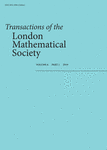
Transactions of the London Mathematical Society
Scope & Guideline
Advancing Mathematical Frontiers for a Global Community
Introduction
Aims and Scopes
- Algebraic Structures:
Research focusing on algebraic entities such as groups, rings, and algebras, exploring their properties, classifications, and relationships within various mathematical frameworks. - Topology and Geometry:
Studies related to the properties of space that are preserved under continuous transformations, including homotopy theory, geometric group theory, and the topology of manifolds. - Functional Analysis and Operator Theory:
Investigations into the properties of function spaces and linear operators, including studies on C*-algebras and their applications in mathematical physics. - Number Theory and Arithmetic Geometry:
Research addressing properties of integers, prime distributions, and algebraic structures over number fields, with implications in cryptography and coding theory. - Homological Algebra and Combinatorial Mathematics:
Exploration of algebraic structures through homological techniques and combinatorial methods, highlighting their applications in various mathematical contexts.
Trending and Emerging
- C*-Algebra and Operator Theory:
A noticeable increase in studies related to C*-algebras indicates a growing interest in operator theory and its applications in quantum mechanics and mathematical physics. - Homotopy Theory and Stable Homotopy:
Emerging research in stable homotopy theory suggests a resurgence of interest in algebraic topology and its applications to modern mathematical problems. - Fusion Systems in Group Theory:
The exploration of fusion systems indicates a trend towards understanding group actions and their applications in various mathematical settings, particularly in finite group theory. - Boundary and Caloric Measure Studies:
Research addressing boundary properties and caloric measures reflects an increasing focus on analytical aspects of mathematical structures, particularly in relation to partial differential equations. - Combinatorial Techniques in Algebra:
The intersection of combinatorial mathematics with algebra suggests an emerging trend towards utilizing combinatorial methods to solve algebraic problems, enriching both fields.
Declining or Waning
- Classical Geometry:
While still relevant, topics specifically focusing on classical geometric constructs have become less prominent, possibly due to the rise of more abstract and generalized geometric theories. - Elementary Number Theory:
Research centered on basic properties of integers and elementary properties has seen a decrease, as more complex and applied aspects of number theory gain traction. - Real Analysis Techniques:
Traditional methods in real analysis are becoming less frequent as the field shifts towards more abstract frameworks and the application of functional analysis and operator theory.
Similar Journals

Pure and Applied Mathematics Quarterly
Fostering Innovation in Mathematical DisciplinesPure and Applied Mathematics Quarterly is a prestigious journal published by INT PRESS BOSTON, INC, focusing on the diverse and evolving field of mathematics. Since its inception in 2007, this journal has grown significantly, currently holding a Q1 ranking in the Mathematics (Miscellaneous) category for 2023, positioning it among the leading publications in the discipline. With a commitment to publishing high-quality research, Pure and Applied Mathematics Quarterly fosters innovation and dialogue within the mathematical community by providing a platform for theoretical advancements and practical applications. The journal remains accessible to researchers and professionals through its ISSN 1558-8599 and E-ISSN 1558-8602, although it does not currently offer open access. As a vital resource for mathematicians, educators, and students, this journal endeavors to expand the frontiers of mathematical knowledge and contribute to the academic dialogue surrounding this fundamental science.

Mediterranean Journal of Mathematics
Connecting Scholars Through High-Quality Mathematical ResearchThe Mediterranean Journal of Mathematics, published by SPRINGER BASEL AG, is a prominent platform dedicated to the advancement of mathematical research and education. Since its inception in 2004, this journal has been pivotal in disseminating high-quality research across various fields of mathematics, currently holding a notable Q2 ranking in the miscellaneous mathematics category as of 2023. With its ISSN 1660-5446 and E-ISSN 1660-5454, the journal enjoys a respected position in the academic community, evident by its Scopus rank of 129 out of 399 in General Mathematics, placing it in the 67th percentile. While primarily a subscription-based journal, it remains committed to providing a comprehensive resource for researchers, professionals, and students, fostering dialogue and exploration within the mathematical sciences. The Mediterranean Journal of Mathematics, based in Basel, Switzerland, continues to contribute significantly to the evolution of mathematical theory and practice, marking its relevance as we approach its 20th anniversary in 2024.

Acta Mathematica Vietnamica
Charting New Territories in Mathematical SciencesActa Mathematica Vietnamica is a reputable journal in the field of mathematics, published by Springer Singapore Pte Ltd. With an ISSN of 0251-4184 and an E-ISSN of 2315-4144, this journal has been a significant platform for disseminating research findings and advancements in mathematical theories and applications since its inception. It currently holds a Q3 ranking in Mathematics (miscellaneous) for the year 2023, reflecting its growing influence within the academic community. Despite being based in Singapore, Acta Mathematica Vietnamica resonates globally, attracting contributions from researchers and professionals worldwide. While the journal operates under a subscription model, it offers robust access options, ensuring that critical research is accessible to a diverse audience. Researchers and students will find invaluable insights within its pages, facilitating a deeper understanding and exploration of advanced mathematical concepts. As it continues to converge from 2011 to 2024, this journal remains dedicated to fostering innovation and collaboration in the mathematical sciences.
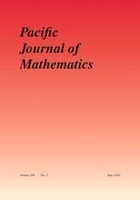
PACIFIC JOURNAL OF MATHEMATICS
Championing Excellence in Mathematical ScholarshipThe PACIFIC JOURNAL OF MATHEMATICS, established in 1951 and published by Mathematical Sciences Publishers, is a premier peer-reviewed journal in the field of mathematics, renowned for its rigorous scholarship and impactful research contributions. With an HIndex that reflects its sustained academic influence, this journal has been categorized within the Q1 quartile in the field of mathematics (miscellaneous) as of 2023, showcasing its position among the top-tier mathematics journals globally. Although the journal operates under a traditional subscription model rather than an Open Access format, it remains dedicated to disseminating original research that spans various domains within mathematics. Researchers, professionals, and students alike will find the journal's breadth of topics and commitment to quality work instrumental in advancing their understanding and exploration of mathematical concepts. This esteemed journal continues to thrive as a vital resource for the mathematical community through its comprehensive collection of articles from a diverse range of mathematical disciplines, thus maintaining a significant role in shaping the future of mathematical inquiry.
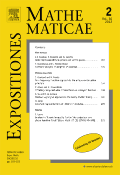
EXPOSITIONES MATHEMATICAE
Exploring Innovative Theories in MathematicsEXPOSITIONES MATHEMATICAE, published by Elsevier GmbH, stands as a significant journal in the realm of mathematics, catering primarily to researchers, professionals, and students. With an ISSN of 0723-0869 and an E-ISSN of 1878-0792, this journal has made its mark in the academic community, boasting a Q2 classification in the miscellaneous mathematics category for 2023, illustrating its prominence within its field. The journal addresses a diverse scope of mathematical topics, encouraging the publication of original research and innovative theories while maintaining rigorous academic standards. As it converges from 2004 to 2024, EXPOSITIONES MATHEMATICAE continues to be an essential resource for advancing mathematical knowledge and fostering scholarly communication, despite being a non-open-access publication. Its location in Munich, Germany further anchors it within a rich intellectual tradition, providing accessibility for the mathematical community worldwide.
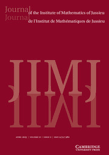
Journal of the Institute of Mathematics of Jussieu
Fostering Collaboration for Tomorrow's Mathematical BreakthroughsJournal of the Institute of Mathematics of Jussieu, published by Cambridge University Press, is a leading academic journal that has established itself as a vital resource in the field of mathematics. With an impressive impact factor and a ranking in the top quartile (Q1) of miscellaneous mathematics, the journal serves as a platform for high-quality research from both established scholars and emerging researchers. Spanning from 2002 to 2024, the journal aims to foster collaboration and innovation in the mathematical community by publishing original research articles, reviews, and critical discussions on a wide range of mathematical topics. Although the journal does not offer open access, it remains widely accessible through various academic institutions and libraries, ensuring that critical advancements in mathematics are shared with a global audience. Located in the United Kingdom at the prestigious Cambridge campus, the journal reflects the rigorous standards of its publisher and the rich academic tradition of its home institution.

CANADIAN JOURNAL OF MATHEMATICS-JOURNAL CANADIEN DE MATHEMATIQUES
Connecting scholars through high-quality mathematical insights.Canadian Journal of Mathematics - Journal Canadien de Mathématiques is a prestigious peer-reviewed journal published by Cambridge University Press, which aims to advance the field of mathematics through the dissemination of high-quality research articles. With its ISSN 0008-414X and E-ISSN 1496-4279, the journal plays a pivotal role in fostering mathematical research and collaboration. It has been recognized for its impactful contributions, currently holding a category quartile ranking of Q2 in Mathematics (miscellaneous) for 2023 and sits in the 66th percentile among its peers according to Scopus rankings. As the journal continues its convergence from its inception in 1994 through to 2024, it remains a vital resource for researchers, professionals, and students seeking to stay at the forefront of mathematical developments. The journal does not operate under an open access model, allowing for a curated collection of articles that adhere to rigorous academic standards.
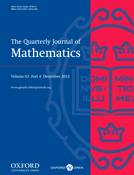
QUARTERLY JOURNAL OF MATHEMATICS
Exploring the Depths of Mathematical InnovationQuarterly Journal of Mathematics, published by Oxford University Press, stands as a pivotal resource for the mathematical community, focusing on a broad spectrum of topics in the field of mathematics. With its esteemed history dating back to 1930, this journal continues to foster innovative research and discussions, providing a platform for scholars to share their findings and insights. Although the journal currently holds a Q3 classification in mathematics (miscellaneous) and is ranked #207 among general mathematics publications in the Scopus database, its commitment to quality and rigorous peer review ensures that it remains relevant and insightful. Researchers, professionals, and students alike will find the Quarterly Journal of Mathematics an invaluable tool for advancing knowledge and understanding in various mathematical disciplines, making it an essential addition to any academic library.

JOURNAL OF THE EUROPEAN MATHEMATICAL SOCIETY
Advancing Mathematical FrontiersThe JOURNAL OF THE EUROPEAN MATHEMATICAL SOCIETY, published by the EUROPEAN MATHEMATICAL SOCIETY (EMS), stands as a premier platform in the field of mathematics, known for its rigorous editorial standards and impactful contributions to both applied and theoretical aspects of the discipline. With a commendable Q1 ranking in both Applied Mathematics and Miscellaneous Mathematics categories, alongside a Scopus rank of 32 out of 399 in General Mathematics, this journal has established itself as a crucial resource for researchers and professionals. Since achieving Open Access status in 2021, it has expanded its reach, making cutting-edge research more accessible to a global audience. With a publication horizon extending from 2002 to 2024 and a dedicated focus on high-quality mathematical scholarship, the journal continues to foster innovation and collaboration within the mathematical community.

Collectanea Mathematica
Connecting researchers to the forefront of mathematical discovery.Collectanea Mathematica is a distinguished academic journal published by SPRINGER-VERLAG ITALIA SRL, dedicated to the field of mathematics, with a specific focus on both applied and theoretical aspects. Renowned for its rigorous peer-review process, the journal aims to advance knowledge in various mathematical disciplines, showcasing high-quality research that significantly contributes to the understanding of mathematical principles. With an impressive impact factor, and categorized in Q1 and Q2 quartiles for miscellaneous and applied mathematics respectively, Collectanea Mathematica plays a vital role in the academic community, catering to researchers, professionals, and students alike. The journal spans its convergence years from 2006 to 2024, reflecting a rich history of excellence and innovation in mathematical literature. With its strategic position within the Scopus rankings, it remains a pivotal resource for those seeking to stay at the forefront of mathematical research.